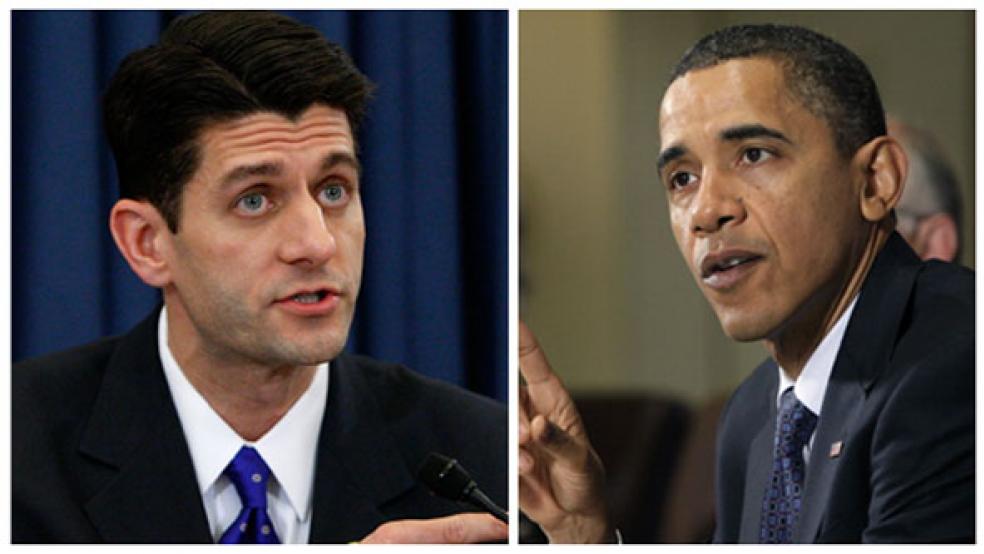“Where’s Obama?”
It’s the unavoidable question that is leaving Obama’s constituency largely dumbfounded-- a question that has two answers and dramatic implications for our future.
“Where’s Obama?” Answer #1: When it comes to fighting for fiscal priorities, he’s nowhere.
On Tuesday, House Budget Committee Chairman Paul Ryan proposed to dramatically shrink the welfare state, turn Medicare into a voucher program, convert Medicaid and food stamps to block grants, slash domestic discretionary spending, make President Bush’s tax cuts permanent, and cut the top tax rate to 25 percent – all of which could significantly reduce aid to the poor and shower more tax cuts mainly on the rich.
President Obama, who met that day with congressional leaders of both parties in an effort to finish 2011 appropriations, said in a press briefing,
“Now, we’ll have time to have a long discussion about next year’s budget, as well as the long-term debt and deficit issues, where we’re going to have some very tough negotiations. And there are going to be I think very sharply contrasting visions in terms of where we should move the country."
That’s all Obama would say. He did not criticize Ryan’s plan to kill health reform, his signature achievement; extend Bush’s tax cut for those at the top, which Obama promised to end; or shrink federal spending to below 20 percent of Gross Domestic Product (GDP) by 2015 and almost 15 percent of GDP by 2050– a level not seen since 1951, before the federal government created, for instance, Medicare, Medicaid, food stamps, the Departments of Education, Veterans Affairs, and Homeland Security, and the Environmental Protection Agency.
The White House would only muster a critical statement, late in the day, from Press Secretary Jay Carney, noting that Ryan’s plan “cuts taxes for millionaires and special interests while placing a greater burden on seniors who depend on Medicare or live in nursing homes, families struggling with a child who has serious disabilities, workers who have lost their health care coverage, and students and their families who rely on Pell grants.”
As for the 2011 process, the President took pride less in fighting for his priorities than in capitulating to GOP demands for more cuts.
Back in February, House Republican leaders had demanded $73 billion in cuts from Obama’s proposed level for 2011 discretionary spending as their price for finishing the appropriations process. That, by the way, is about three-quarters of the way to Republicans’ election 2010 goal of cutting $100 billion from current spending, which progressives in Washington had mocked.
On Tuesday, Obama made clear that he accepted the $73 billion, notwithstanding criticism from progressives. It would be, he boasted, “in absolute terms the largest cuts in domestic discretionary spending in history” and “in relative terms… the largest cuts as a percentage of GDP since 1982.”
“Where’s Obama?” Answer #2: When it comes to politics, he’s just where he wants to be – on a path to likely re-election.
The 2010 mid-term elections, during which Obama had taken what he called a “shellacking,” signaled broad public unhappiness over not just economic conditions but the President’s efforts to expand government in rejuvenating the economy, reforming health care, and addressing climate change.
With all-important independent voters fleeing the President in droves, he tacked sharply to the center after the election, striking a deal with Republicans in December to cut taxes and extend jobless benefits.
Facing a new Congress since January, with a GOP-run House and a Senate in which Republicans have the votes to prevent any action, Obama has sought, as Administration officials have put it, to “stay above the fray,” to act like “the grown-up,” as part of his effort to strengthen his public standing.
It’s working. The President’s job approval numbers are up and his chances for re-election are rising.
At this stage, NBC’s political unit finds Obama with 232 electoral votes that are “solid, likely, or lean” in his direction, and Republicans with 191. “When asked to estimate Obama’s reelection chances,” political prognosticator Charlie Cook wrote late last month, “political pros cite figures in the range of 60 percent to 70 percent, although with plenty of caveats about unforeseen events.”
What’s the implication of Obama’s broad-scale refusal to fight for fiscal matters, combined with his growing political strength?
Politicians don’t tend to mess with success. Politically, the President’s approach is working. If he stays on his current path and grows stronger, he will surely commit even more strongly to that path.
On the fiscal front, progressive priorities would continue suffering, which would only prod Republicans to push even harder for more spending cuts and tax cuts with which Obama might feel compelled to accept.
Ironically, a President who had vowed in 2008 to reinvigorate the federal government, and who pursued that path while reviving a weak economy and reforming health care, could find himself after his re-election presiding over a government that’s moving in the opposite direction.
Related Links:
President Obama Staying in Background on Deficits (Politico)
From Japan to the Deficit, Obama's Listless Leadership (Huffington Post)
Ralph Nader: Obama's Puzzling Silence (Counter Punch)






